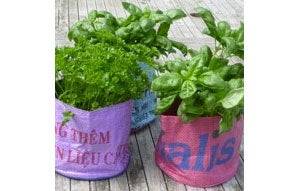Designs that make a difference
Stalls with ethics shine at this week’s Spirit of Summer Fair, says Annie Deakin

‘People are certainly attracted to our stall because of the Fairtrade angle,’ says Sarah-Jane Lebus who is selling reused rice bags from Cambodia at this week's Spirit of Summer Fair in Olympia. Among the hundreds of stands flogging new interior accessories are a handful of ethical ones, each with their own mission to give back to the developing world. The impoverished rural artisans of Cambodia, South Africa and Bangladesh are the unsung stars of the Spirit of Summer show (until 14 May 2011).
Three years ago, Lebus and old school friend Sarah Speers set up Recycle Recycle 'helping people in Cambodia, and helping ourselves.' They sell washbags and picnic rugs handmade from rice bags by disadvantaged people in Cambodia. Each is individual; no two patterns are the same. Their bestseller is the ‘Fairtrade funky pot’ (£5.50) as featured as an editor’s pick in Living Etc (June 2010). The business works on two accounts; Lebus and Speers are motivated by the sense of helping those in need and the kitchen-table type business suits their families. Between them, they have seven children (the youngest Maya is four, the eldest Genevieve is 13).
‘We wanted to support an organisation that had ethics and high standards,’ says Lebus who has visited the project in Cambodia. ‘We saw the difference we are making to the lives of several families and they are constantly reiterating this fact to us. Our carpenter - called Chien – was born at the end of the Pol Pot regime when there was no medical care. When he was a baby, he fell off a table, broke his back and couldn’t have any treatment. Today, instead of begging on the streets, Chien carves coconut shell hooks for our washbags. There are thousands of people like him in Cambodia left begging on the street.' It is such images that haunt Lebus and Speers when the workload seems too much. They think of the Cambodian families needing their help. 'We receive super emails from them thanking us so much. Last week, they emailed to say that they’re praying for us at this fair.’
Textile designer Sophie Pattinson is familiar with the sense of responsibility that comes when working with disadvantaged people the other side of the world. Also showing at Spirit of Summer Fair, Pattinson sells hand-embroidered bedspreads and cushions (adorned with Edward Lear sketches) sewn by women in North West Bangladesh. ‘My project is about creating an income for the Bangladeshi women and improving their lifestyle,’ she says, ‘That is the motivation that keeps me going.'
Pattinson's work in the deprived areas of Bangladesh began over ten years ago when the EU asked her to establish a project helping women there. She taught embroidery to eight groups of 20 women enabling them to produce embroidered items with designs suitable for the European market – and support themselves. When, ten months down the line, the EU withdrew funding, it was up to Pattinson to take charge or risk the project imploding. She now runs the business independently. ‘The money the women earn from the embroidery is mostly used to improve their children’s education and living conditions. It allows them to re-build or fix their houses after the devastating monsoons,’ says Pattinson. She spends periods of up to five months in Bangladesh returning laden with embroideries to sell. ‘At a recent fair at Althorp, Earl Spencer bought a few of my embroideries,’ she recalls. As literacy and numeracy improves among her seamstresses, so does the reality of growing her business. ‘I am contemplating going bigger scale and selling to shops. It's been quite an uphill struggle even using basic things like a tape measure but the situation is noticeably improving.’
Across the Olympia exhibition hall was Purely African selling photo frames of discarded wood, wolanani bowls and botanical cushions created by rural artisans in Southern Africa. ‘It’s important to support local communities and create jobs for the otherwise unemployed,’ says co-director Debbie Guye who founded the company with fellow South African Abigail Leonard and (English) Charlotte McGill. Their website imports a mix of community-project recycled items and designer South African products. Guye says of the bestselling photo frames; 'Ladies from the rural areas bring timber from broken doors or window frames to Luna farm in Cape Town. Here they are made into photo frames. Luna pays the women for the work and re-uses things that would otherwise go to Cape Town’s over-burdened landfill. If the women weren't working for Luna, they wouldn't find work. It's about empowering people to support themselves.'
Both Lebus and Pattinson know that the ethical stories behind their brands helps push a sale. Yet we all know a sob story is not enough. Thankfully, from the rice bag trug and shabby chic wooden frames to the Edward Lear cushion, the designs are up there with the best. Among a huge amount of mass-market tat, it’s a blessing to see creativity with a cause.
Annie Deakin is interiors writer for sofa and interior design website mydeco.com.
Join our commenting forum
Join thought-provoking conversations, follow other Independent readers and see their replies
Comments
Bookmark popover
Removed from bookmarks